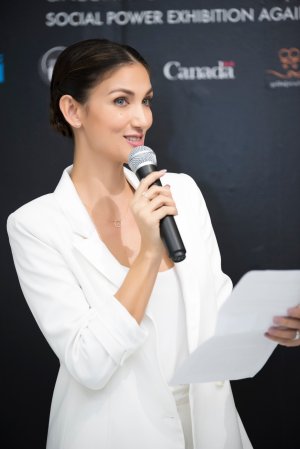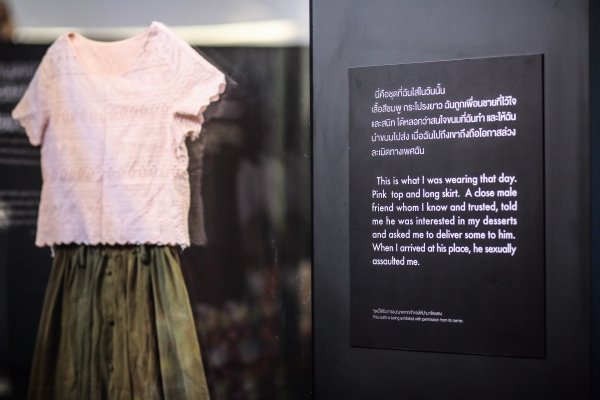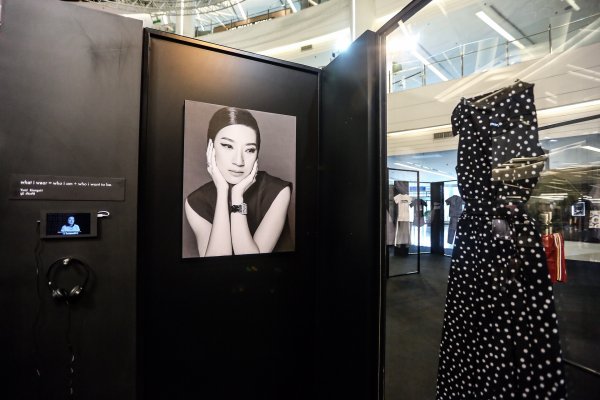Pia Rowe: What is the ‘Don’t Tell Me How to Dress’ campaign? And how did it come about?
Cindy Bishop: Almost a year ago, I was reading my morning paper and I came across a headline which said ‘Don’t dress sexy: Department tells women’. In the article local Thai authorities were advising women to not dress ‘sexy’ in the upcoming Songkran Festival, which is a massive street festival where we celebrate the Thai New Year with big water fights. It’s usually a lot of fun with a festive party atmosphere, but a lot of alcohol is consumed and it has become a potential playground for sexual assault. Around 60 percent of women are usually harassed or assaulted at that time.
I recorded the video and posted it and didn’t really think anything of it, until a few hours later when I realised it had gone viral
The newspaper article (telling women how to dress, or ‘not dress’) didn’t sit right with me, so I picked up my phone and recorded a clip in Thai about how ridiculous it was. I was a victim of assault during Songkran when I was seventeen years old. At the time I was wearing a baggy t-shirt and three-quarter length jean-shorts. I was surrounded by five men, who were harassing women as their form of entertainment for the day. So, after reading the article, I recorded a short video statement and posted it. I didn’t really think anything of it, until a few hours later when I realised it had gone viral. There were thousands of comments being posted from women all over the country, and they were sharing their stories and views. It was moving really, really fast.

The speed of it woke me up. I kept monitoring it for a bit and then it started getting media attention. At first the interest came from entertainment news, saying ‘Oh who’s this celebrity speaking out against the authorities’, and very soon it became mainstream news. It then got international media attention. Bloomberg reached out first, then NHK came and did a feature on me after I was invited to speak at a seminar on this topic. Following that, the BBC and Time Magazine also got in touch.
… it was a perfect storm to start a movement.
All of a sudden there was this incredible opportunity, and the more I listened to stories of the women who were responding to my message, the more I realised that apparently this is a topic people are really emotional about and they’re ready to speak up. It might have been the #MeToo movement happening around the world, or maybe it was the fact that I came out and said something, I don’t know. But it was a perfect storm to start a movement.

PR: Can you contextualise this a little? What is the situation in Thailand more broadly in terms of gender equality? What are some of the biggest issues at the moment?
CB: In Asia we are kind of in the middle. We still have a very traditional, conservative society. Although not as conservative as other countries, as women here do enjoy some freedom and basic rights. We have a lot of women in corporate leadership, a lot of women CEOs in media, in businesses… not so much in politics, which is something I’d like to see change. But there is an underlying current of conservatism and patriarchy in the culture. The Thai woman is supposed to be a mother. Tradition is still very much communicated through a woman’s role as a mother.
The way you say ‘gender’ in Thai is the ‘mother gender’. It’s called ‘Pheṣ̄ mæ̀’, so it’s very much tied to that role.
In fact the way you say ‘gender’ in Thai is the ‘mother gender’. It’s called ‘Pheṣ̄ mæ̀’, so it’s very much tied to that role. There are lots of stereotypes and misconceptions when it comes to freedom of expression.
When women are harassed or assaulted in some way it always comes back to victim blaming. It’s ‘well you shouldn’t have been in that situation in the first place… why were you drinking?’ Or ‘why were you out late at night? You should be home… why were you wearing that? A good girl wouldn’t wear that’.
PR: Once your video went viral and attracted such a big public response, did you receive any backlash or retaliation as a result of your actions? Were you criticised for speaking out?
CB: To be honest, not a big backlash. One or two comments maybe. If there is another platform where there’s been a lot of pushback I haven’t seen it, nor do I really care to seek it out.
I spoke out against a Thai official, yet I (then) received an award from the Prime Minister for ‘Activist of the Year’.
Overwhelming the support has been very good. What’s interesting is that I spoke out against a Thai official, yet in November last year I received an award from the Prime Minister for ‘Activist of the Year’. I will leverage that to make my message heard more broadly.

PR: So there has not been any attempt to silence you?
CB: No, because I’ve been very careful and deliberate in the way that I have spoken out. I am extremely mindful of the fact that I am Thai. I am a Thai woman. Even though I don’t necessarily look it. I was born and raised in this country. I have ‘western’ ideals and those things help shape my opinions, but I’m still very mindful of the message. And I think that’s probably why my message has been well received. I back it up with a very good dose of why I’m saying this, what it is that I’m upset about, and then what solutions I think are needed.
I’m still a huge believer in dressing appropriately for the situation and occasion. I believe in being respectful
There were a few critics in the beginning, but I very calmly took them on and said “look, if you are thinking that my #DontTellMeHowToDress is an invitation for women to take to the streets in their underwear, please go back and listen to what I had to say.” I know that even though that’s being done in some countries, that would not go well in Thailand. Nor am I wanting that. I’m still a huge believer in dressing appropriately for the situation and occasion. I believe in being respectful of your surroundings, and I’ve said that. Part of being respectful is also realising the effect that you have on other people.
PR: You also turned your campaign into an exhibition last year, with a view to challenge some of the misconceptions around sexual assault. Have you seen any concrete change from that campaign or the exhibition?
CB: The exhibition was something I wanted to do right after the social media campaign, because there was a good opportunity and I didn’t want it to just fade with a few Facebook posts. When I was invited by the Progressive Women and Men foundation of Thailand to take part in their seminar on this topic, I realised that they had access to victim’s cases and their clothing. That gave me the idea to bring this issue into the public space.
I then went knocking on UN Women’s door and that helped bring about the exhibition. But I realised just having victim’s clothing on exhibit wouldn’t be impactful enough. To do anything in Thailand you need star power. I reached out to my celebrity friends, in order to get them to start talking about this very taboo subject. In Thailand we still don’t talk about this and that’s part of the reason.
I wanted it to smack people right in the middle of a normal shopping day. And it was amazing…
To put a really public face on the issue, we placed the exhibition in the middle of the biggest mall in Bangkok, which had not been done before. I wanted it to smack people right in the middle of a normal shopping day. And it was amazing – I would sit back and watch the reactions of people. Those who knew it was there would go and experience it, but we’d also get people who were just going about their daily shopping, who would then be struck by the reality of the situation and visibly shaken, some were even moved to tears.
PR: is there a broader women’s movement in Thailand? Feminism in Australia is becoming more prominent again, but is there something equivalent happening?
CB: It’s happening, but it hasn’t previously been galvanised into a single movement everyone can get behind. The strength of #DontTellMeHowToDress has been that it’s recognisable. University students doing their thesis on this are contacting me, some doing presentations ask me to be their advisor, especially in the area of mass communication and using social media communication as a tool for social change, which is so exciting for me.
The exhibition itself is still on tour, moving to different places. We just ran it at an art forum. We had it at the UN headquarters here in Bangkok. We’ve got three more universities that will also display it. I’m also developing ways to reach younger audiences.
PR: Do you have any intentions to take this campaign beyond Thailand and reach a global audience?
CB: I don’t know about global but it’s definitely going regional. In November of last year we launched #DontTellMeHowToDress as part of the #RespectoNaman campaign, which is a nationwide campaign in the Philippines. I’m also heading to Singapore to launch the campaign there, in partnership with with UN Women and Aware.

It really depends on who I have on the ground in each country. I can’t physically go and do it. And it needs to be local to each country. If there is interest from anyone, any country, that wants to do a local version I will very happily consult and send them what we’ve done here in Thailand. It would be amazing to roll this out globally. Let’s think big!
PR: Is there any key message that you would like people to take away from the Thai experience and the campaign?
CB: Women have a right to express themselves and we have a right to our own bodies. The other key message is change can happen and should happen with every single one of us. I honestly had no idea that this was going to happen and it did. Granted I am a public person, there are things that happened more easily, but I think this is a conversation that every single one of us needs to be asking ourselves. What’s happening in our communities and what can we be doing about it? Or even if it’s just to bring a bigger awareness, a clearer awareness to our lives as well. Be a part of the conversation!





